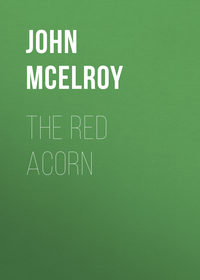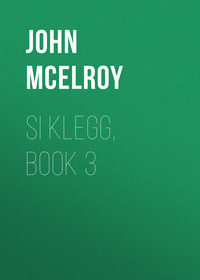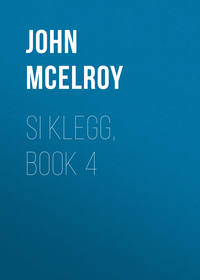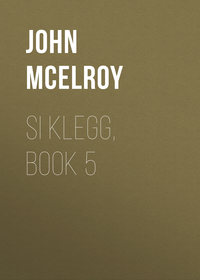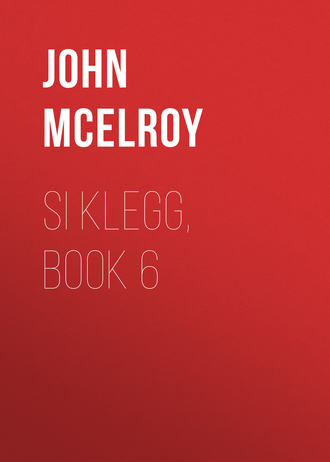 полная версия
полная версияSi Klegg, Book 6
"They didn't think they were digging their own graves," philosophized Monty Scruggs, as he stood shovel in hand watching the remains being gathered into the trench.
"He digged a ditch, he digged it deep;He digged it for his brother,But for his great sin he fell inThe ditch he'd digged for t'other.""Good, good, Monty," said Si. "That's the best thing I've heard you spout yit. Give us some more of it."
"There isn't any more of it. The only thing I can think of is:
"The rebel Solomon Grundy;Born in Georgia on Monday;Become a rebel on Tuesday;Run off from Buzzard's Roost on Wednesday;Got licked at Dalton on Thursday;Worse whipped at Resaca on Friday;Blown up by a shell on Saturday;Died and buried on Sunday;And this was the end of Solomon Grundy."Alf Russell's interest in anatomy had led him to join Serg't Wilson's party in gathering up the ghastly fragments of bodies, but the sights were too much for his nerves, and as he perceived that he was growing sick at the stomach he went over to Shorty's squad.
It was astonishing what things they found, besides guns and equipments. Evidently, the rebels had left quite hurriedly, and many personal belongings were either forgotten or could not be found in the darkness. Samples of about everything that soldiers carry, and a good many that they are not supposed to, were found lying around. There were cooking utensils, some on the fire, with corn-pone and meat in them; some where the imperative orders to march found their owners with their breakfasts half-devoured; there were hats clumsily fashioned of wisps of long-leaved pine sewed together; there were caps which had been jaunty red-and-blue "Zouaves" when their owners had mustered around Nashville in 1861, but had been faded and tarnished and frayed by the mud and rain at Donelson, Shiloh and Stone River, and by the dust and grime of Perryville and Chickamauga, until they had as little semblance to their former perkiness as the grim-visaged war had to the picnic of capturing ungarrisoned forts and lolling in pleasant Summer camps on the banks of the Cumberland. There were coats of many patterns and stages of dilapidation, telling the same story of former finery, draggled through the injurious grime of a thousand camps and marches. There were patched and threadbare blankets, tramped-out boots and shoes, an occasional book, many decks of cards, and so on.
Shorty came across a new cedar canteen with bright brass hoops. He slung it over his shoulder, with the thought that it would be a nice thing to send back to Maria, as a souvenir of the battle. She might hang it up in her room, or make a pin-cushion or a work-basket out of it.
Presently he came to a box of shells, which he picked up and carried back to the tree. It was quite heavy, and when he set it down again he felt thirsty. The canteen occurred to him. It was full. He raised it to his lips and took a long swig.
"Great Jehosephat," he gasped, his eyes starting out with astonishment. "That ain't water. It's prime old applejack, smoother'n butter, and smellin' sweeter'n a rose. Best I ever tasted."
Shorty had been strictly abstinent since his return from Indiana, The rigid views of the Klegg family as to liquor-drinking had sunk into his heart, and somehow whenever temptation came his way the clear, far-seeing eyes of Maria would intervene with such a reproachful glance that the thought of yielding became repugnant.
But the smooth, creamy applejack had slipped past his lips so unexpectedly that it possessed him, before principle could raise an objection. Shorty was the kind of a man to whom the first drink is the greatest danger. After he had one almost anything was likely to happen.
Still, though his blood was already warming with the exhilarating thrill, there were some twinges of conscience.
"Now, I mustn't take no more o' that," he said to himself. "That one drink was good and all right enough, because I really thought I was goin' to take a drink of water when I put the canteen to my lips. I could swear that to Maria on a stack o' Bibles high as her dear head. God bless her!"
He began bustling about with more activity, and giving his orders in a louder voice. He saw Pete Skidmore pick up what had been once a militia officer's gaudy coat, and examine it curiously. He shouted at him:
"Here, drop that, drop that, you little brat. What 'd I tell you? That you mustn't fetch a rag of anything you see in here, except with the point o' your bayonet and with your bayonet on your gun. Drop it, I tell you."
"Why, what's the matter with that old coat?" asked Pete in an injured tone, astonished at Shorty's vehemence.
"Everything's the matter with it, and every stitch o' cloth you find. They're swarmin' with rebel bugs. I've trouble enough to keep the Yankee graybacks off you. If you git the rebel kind on you angwintum won't save you."
Pete dropped the coat in affright.
"And you, Sandy Baker," continued Shorty in a yell, "don't you walk through them piles o' brush and leaves, where the rebels has bin sleepin'. You'll git covered with rebel bugs, too, and we'll never git 'em out o' the company. How often 've I got to tell you that?"
Yelling so much made him dry, and the canteen hung so invitingly near his hand.
"I don't think another pull at that old applejack 'll hurt me a mite. I really didn't git a square drink the first time, because I was choked off by astonishment at findin' it wasn't water. I'll just take enough of a swig to finish up that drink."
"Jerusalem crickets," he exclaimed, wiping his mouth, "but that's good stuff. Wonder if bein' in cedar makes it taste so bang-up? If I though so I'd never drink out o' anything but cedar as long's I lived. Guess I'll keep this canteen to carry water in. I kin send Maria—"
He stopped. He was not so far gone as to forget that any thought of Maria was very inappropriate to his present condition. He started to blustering at the boys who were carrying in guns:
"Here, how often have I got to caution you galoots about bein' careful with them guns? Don't let the muzzles pint at yourselves, nor anybody else. They're all likely to be loaded, and go off any minute, and blow some o' your cussed heads offen you. Don't slam 'em down that way. Be careful with 'em, I tell you. I'll come over there and larrup some o' you, if you don't mind me."
"What's excitin' Shorty so, to make him yell that way? wondered Si, stopping in his shoveling down the embankment upon the rebel dead, and wiping his hot face.
"O, he's trying to keep them fresh young kids from blowin' themselves into Kingdom Come with the rebel guns," answered one of the veterans indifferently, and they resumed their shoveling.
Shorty started over to where some of the boys were trying to extricate a rebel limber abandoned in a ravine. He spied a pair of fine field glasses lying on the ground, and picked them up with an exclamation of delight.
"Great Jehosephat," he said, turning them over for careful inspection. "Ain't this a puddin'? Just the thing to give the Cap. He got his smashed with a bullet comin' through the abatis, and's bin mournin' about 'em ever since. These is better'n his was, and he'll be ticked to death to git 'em."
He put them to his eyes and scanned the landscape.
"Ain't they just daisies, though. Bring that teamster over there so close that I kin hear him cussin' his mules. Cap'll have a better pair o' glasses than the Colonel or the General has. He deserves 'em, too. Capt. McGillicuddy's good all the way through, from skin to bone, and as brave as they make 'em. He'll be tickleder than a boy with a new pair o' red-topped boots. He'll invite me to take a drink with him, but he won't have nothin' so good as this old apple-jack. I guess I'll give the rest to him, too, for his friends at headquarters. They don't often smack their lips over stuff like that. But I'll treat myself once more, just as Capt. McGillicuddy'd do."
The last drink was a settler. He was then in a frame of mind for anything—to tear down a mountain, or lift a hill, or to fight anybody, with or without cause. He looked over at the boys struggling with the limber, and yelled, as he laid his coat, hat, canteen, and cartridge-box down on the stump upon which he had been sitting, and placed the field-glass upon them:
"Hoopee! Yank her out o' there, boys. Yank h'er out, and don't be all day about it, either. Let me git at her and I'll fetch her out. Stand by, you kids, and see your uncle Eph snatch her."
He bolted in to the ravine, swung the limber-tongue about, and with aid of the rest, stirred to united effort by much profane vociferation on his part, disengaged the limber and trundled it up the bank.
The tall, very stiff young Aid, with whom Si and Shorty had had the previous affair, came stalking on to the ground, viewing everything with his usual cold, superior, critical gaze.
"You are doing well, my man," he remarked to Shorty, "but too much noise. A non-commissioned officer must not swear at his men. It's strictly against regulations."
"Go to blazes," said Shorty, scarcely under his breath. The Aid picked up the field-glasses, looked at them a minute, scanned the field with them, and then looked around for the case, as if to appropriate them himself.
"Here, drop them," said Shorty roughly. "Them's mine."
"How did they come to be yours, sir?" said the Aid sternly. "Picked them up, didn't you?"
"None o' your business how I got 'em. They're mine, I tell you. Give 'em to me."
"You picked them up on the battlefield, sir. They are military equipments which you must turn over to the proper officer. I'll take charge of them myself."
"You'll do nothin' o' the kind," roared Shorty, striding up to him. "Give me them glasses."
"I shall do nothing of the kind," said the Aid sternly. "Don't you dare approach me in that w-ay. Go back to your duties at once. I shall punish you for disrespect to me and threatening an officer. Fall back, sir, I tell you."
Shorty made a grab for the glasses, which the Aid tried to evade, but Shorty fixed his firm clutch upon them. The Aid held on tightly, but Shorty wrenched them from his grasp.
"You bob-tailed brevet West Pointer," said Shorty savagely, raising his fist, "I've a notion to break you in two for tryin' to beat me out o' what's mine. Git out o' here, or I'll—"
"Shorty! Shorty! Stop that!" shouted Si, rushing over to his partner, and catching his back-drawn fist. He had been suspicious as to the cause of his partner's noisiness, and ran up as soon as the disturbance began. "Stop it, I say. Are you crazy?"
Poor little Pete, badly excited as to what was happening to his best friend, was nervously fumbling his gun and eyeing the Aid.
"Si Klegg, go off and mind your own business, and let me attend to mine," yelled Shorty, struggling to free himself from his partner's iron grasp. "Am I goin' to be run over by every pin-feather snipe from West Point? I'll break him in two."
"Sergeant," commanded the Aid, reaching to take the field-glasses from Shorty's hand; "buck and gag that man at once. Knock him down if he resists. Knock him down, I say."
"You tend to your own business and I'll tend to mine. Go away from here, and don't say anything to make him madder, you wasp-waisted errand boy," said Si savagely, as he thrust himself in between the Aid and Shorty. "I've got enough to do to take care of him. Go off, if you don't want him to mash you."
Little Pete had an idea. He wriggled in between, snatched the glasses, and made off with them.
The Brigade Provost-Marshal rode up and sternly demanded what the disturbance was about. Shorty began a hot harrangue against young staff officers generally, and this particular offender, but Si got his arm across his mouth and muffled his speech. The Provost listened to the Aid's bitter indictment against both Si and Shorty.
"Put both those men under arrest," he said to the Orderly-Sergeant, "and make a list of the witnesses. I'll court-martial them at the first halting place."
CHAPTER XX. SHORTY IS ARRAIGNED BEFORE THE COURT-MARTIAL
TO REST, refit after the sharp fighting and marching, and to wait for the slightly wounded and other convalescents to come up, the brigade went into camp on the banks of the Oostenaula River, near Calhoun, Ga., and about 20 miles south of Dalton, which had been the objective at the opening of the campaign.
And while the men were washing and mending their clothes, it was decided to put the discipline of the brigade, which had suffered similarly by the rough campaign, through a somewhat like process of furnishing and renovation.
A court-martial was ordered, "to try such cases as may be brought before it."
The court convened with all the form and ceremony prescribed by the Army Regulations for tribunals which pass judgment upon the pay, honor and lives of officers and men.
The officers detailed for the court sent back to the baggage wagons, and got their wrinkled dress-suits out of the valises, they buttoned these to their throats, donned their swords, sashes and white gloves, and gathered stiffly and solemnly about a long, rough table, which had been put up under the spreading limbs of giant oaks. Guards pacing at a little distance kept all the curious and inquisitive out of earshot. The camp gossips, full of interest as to the fate of those who were to be tried, could see an aggravating pantomime acted out, but hear no word.
A squad of offenders of various degrees of turpitude ranging from absence without leave to sleeping on post, were huddled together under the Provost Guard, while Si and Shorty, being non-commissioned officers, were allowed to remain with their company, to be produced by Capt. McGillicuddy when wanted. They kept themselves rigidly apart from the rest of the company, repelling the freely-offered sympathy of their comrades. Si was most deeply concerned about Shorty, who was so desperate over his fall from grace, that he regretted that he had not killed the young Aid, while he was at him, so as to have relieved his comrades of him, and made his own condemnation and execution sure.
"Old Maj. Truax, of the 1st Oshkosh, is President of the court," said the Orderly-Sergeant, as the company was anxiously canvassing the boys' chances.
"Gosh, that settles it," groaned Jerry Wilkinson; "that old bull o' the woods 'd rather shoot a man than not. He's always lookin' around for some excuse for sculping a man, and the less he has the savager he is."
"I don't believe it," said the Orderly, "I've watched old Truax, when he's been roaring around, and I always found that he was after somebody that deserved it. Men of that kind are pretty certain to be very soft on good soldiers, like Si and Shorty, and I think he's all right. The boys of the 1st Oshkosh all swear by him, and you can trust a man's own regiment to know him surer than anybody else. And then there's Capts. Suter and Harris, of the Maumee Muskrats."
"Terrible strict," muttered Jerry despairingly.
"Lieuts. Newton and Bonesteel, of the Kankakees," continued the Orderly.
"Good men—promoted from the ranks, and remember that they once carried a gun themselves."
"Lieut. McJimsey, of the staff."
"A wasp-waisted West Pointer, raw from school; thinks he's learned all there's to know about war out of a book on triggernometry. Has no more feelin' for a private soljer than I have for a mule. Calls 'em 'my men,' roared Jerry.
"And as he's only a Second Lieutenant he'll have the first vote," sighed the Orderly. "And Lieut. Bowersox is to be the Judge-Advocate. He'll have to do the prosecuting. I know he hates the job. He thinks the world and all of Si and Shorty, but he's the kind of a man to do his duty without fear, favor or affection. And all of us 'll have to testify. Dumb Shorty's fool soul! Why didn't he get up his ruction somewhere where the boys couldn't see him, and know nothing about it! I've no patience with him or Si."
Lieut. Steigermeyer, the complainant, stalked by in solemn dignity.
"Can't I shoot that dod-blasted Aid, and save Shorty, and take it all on myself?" blubbered little Pete, who had been in tears ever since he had seen the grave assemblage of officers in full dress.
"Shut up, you little fool," said the Orderly savagely. In the selfishness of his sorrow it made him angry to see anybody else show more grief than his.
The Orderly, in stating Lieut. Bowersox's position, forgot, or was not aware of the fact, that while the Judge-Advocate represents the Government at a trial as the Prosecuting Attorney, he is also the counsel for the defense; a dual role which has important and frequently unexpected results.
After the members were duly seated according to rank, with Maj. Truax at the head of the table, Lieut. Bowersox read the order for holding the court, and called the names of the members. He then said:
"Gentlemen, the first case I shall present to your notice is one of exceeding gravity, affecting a member of my own regiment. As it is the most important case that you shall have to consider, I thought it best that it should be disposed of first. Sergeant, bring in Corp'l William L. Elliott, Co. Q, 200th Ind. Volunteer Infantry."
Shorty entered the court with an air of extreme depression in face and manner, instead of the usual confident self-assertion which seemed to flow from every look and motion. He stood with eyes fixed upon the ground.
"Prisoner," said Lieut. Bowersox, "this court has met to try you. Look around upon the members, and see if there is any one to whom you have objection. If so, state it."
Shorty glanced listlessly from the head of the table toward the foot. There his eye rested on the Second Lieutenant for a minute, and then he muttered to himself, "No, he's no worse than the rest ought to be on me," and shook his head in answer to the Judge-Advocate's formal question.
"You will each of you rise, hold up your right hand and be sworn," said the Judge-Advocate, and they each pronounced after him the prolix and ponderous oath prescribed by the regulations:
"You, Maj. Benjamin Truax, do swear that you will well and truly try and determine, according to evidence, the matter now before you, between the United States of America and the prisoner to be tried, and that you will duly administer justice, according to the provisions of an act establishing rules and articles for the government of the armies of the United States, without partiality, favor or affection; and if any doubt shall arise, not explained by said articles, according to your understanding and the custom of war in such cases. And you do further swear, that you will not divulge the sentence of the court, until it shall be published by proper authority; neither will you disclose or discover the vote or opinion of any particular member of the court-martial, unless required to give evidence thereof, as a witness, by a court of justice in due course of law. So help you God."
The President then took the book and administered the same oath to the Judge-Advocate.
"I shall now read the charges and specifications," said the Judge-Advocate, "which are as follows, and he read with sonorous impressiveness:
CHARGE:—Insulting, Threatening, and Striking Superior Officer.
Specification I.—That Corp'l William L. Elliott, Co. Q, 200th Ind. Vol. Inf., did strike and perform other physical violence upon Second Lieut. Adolph Steigermeyer, of the Second Corps, U. S. Engr's, who was his superior officer, and in the performance of his duty, in violation of the 9th Article of War, and contrary to the discipline of the Armies of the United States. This on the march of the army from Dalton, Ga., to Calhoun, Ga., and on the 16th day of May, 1864.
Specification II.—That said Corp'l William I.. Elliott, Co. Q, 200th Ind. Vol. Inf., did threaten physical violence to the said Second Lieut, Adolph Steigermeyer, Second Corps, U. S. Engr's, his superior officer, and who was in the performance of his duty, contrary to the 9th Article of War, and the discipline of the Armies of the United States. This on the march of the army from Dalton, Ga., to Calhoun, Ga., and on the 16th day of May, 1864.
Specification III.—That said Corp'l William L. Elliott, Co. Q, 200th Ind. Vol. Inf., did insult with many opprobrious words, the said Adolph Steigermeyer, Second Corps, U. S. Engr's, his superior officer, in the presence of many enlisted men, in violation of the 6th Article of War and of the discipline of the Armies of the United States. This on the march of the army from Dalton, Ga., to Calhoun, Ga., and on the 16th day of May, 1864.
CHARGE:—Drunkenness on duty.
Specification I.—That said Corp'l William L. Elliott, Co. Q, 200th Ind. Vol. Inf., being then on duty, and in command of a squad of men, was openly and noisily intoxicated and drunk, and incapable of performing said duty, in violation of the 45th Article of war, and the discipline of the Armies of the United States. This on the march of the army from Dalton, Ga., to Calhoun, Ga., and on the 16th day of May, 1864.
CHARGE 3.—Misappropriating Public Property.
Specification I.—That said Corp'l William L. Elliott, being charged with the duty of gathering up and accounting for the property captured from and abandoned by the enemy, did appropriate to himself, attempt to conceal, and refuse to deliver to his superior officer a portion thereof, to wit, one pair of field glasses, in violation of the 58th Article of War, and contrary to the discipline of the Armies of the United States. This on the march of the enemy from Dalton, Ga., to Calhoun, Ga., and on the 16th day of May, 1864.
"O, goodness gracious!" murmured little Pete Skidmore, almost fainting with terror, in the covert of oak leaves, just above the court's head, whither he had noiselessly climbed, to overhear everything. "He's a-goner, sure! They'll shoot him, sure as guns. Saltpeter won't save him. He's broke every Article o' War in the whole book. My, what will I do?"
He slipped down and communicated his information to the anxiously-expectant comrades of Co. Q.
"It mayn't be as bad as we expect," the Orderly-Sergeant tried to console them. "The bite of most of them regulations and charges and specifications ain't never near as bad as their bark. If they were, a good many of us would have been shot long ago. My experience in the army's been that the regulations are like the switches the teachers used to have in school—a willow for the good scholars, and a stout hickory for the bad ones. Still, I'm afraid that Shorty won't get off with less than hard labor for life on the fortifications."
"Prisoner, you have heard the charges and specifications," said Lieut. Bowersox, in a stern voice. "How do you plead to them?"
"O, I'm guilty—guilty o' the whole lot," said Shorty dejectedly.
"Inasmuch," said Lieut. Bowersox, with an entire change of tone, "as it is my duty to represent the prisoner's interests as counsel, I shall disregard his plea, and enter one of not guilty."
Shorty started to gasp. "But I done all that—"
"Silence," thundered Lieut. Bowersox, "you are only to speak, sir, when I or some other member of the court ask you a question."
"But has the Judge-Advocate the right to disregard the plain plea?" Lieut. McJimsey started to inquire, when the President interrupted with,
"Lieutenant, we can have no discussion of the court's practices in the presence of the prisoner. If you want to enter upon that we shall have to clear the court. Do you desire that?"
There was something in the bluff old Major's tone that made the Lieutenant think this inadvisable, and he signified the negative.
"Call your first witness, then, Judge-Advocate," said Maj. Truax, with a wave of his hand.
Lieut. Steigermeyer, in full-dress, even to epaulets, rigidly erect and sternly important as to look, testified that he was a Second Lieutenant in the Regular Army, but had the staff rank of Captain and Inspector-General, and after going out of his way to allude to the laxness of discipline he found prevailing in the Western armies, testified that on the day mentioned, while in pursuance of his duty, he was going over the battlefield, he came upon the prisoner, whose drunken yelling attracted his attention; that he had admonished him, and received insults in reply.
"My way is to knock a man down, when he gives me any back talk," remarked the Major, sotto voce, taking a fresh chew of tobacco. "That's better than court-martialing to promote discipline."



